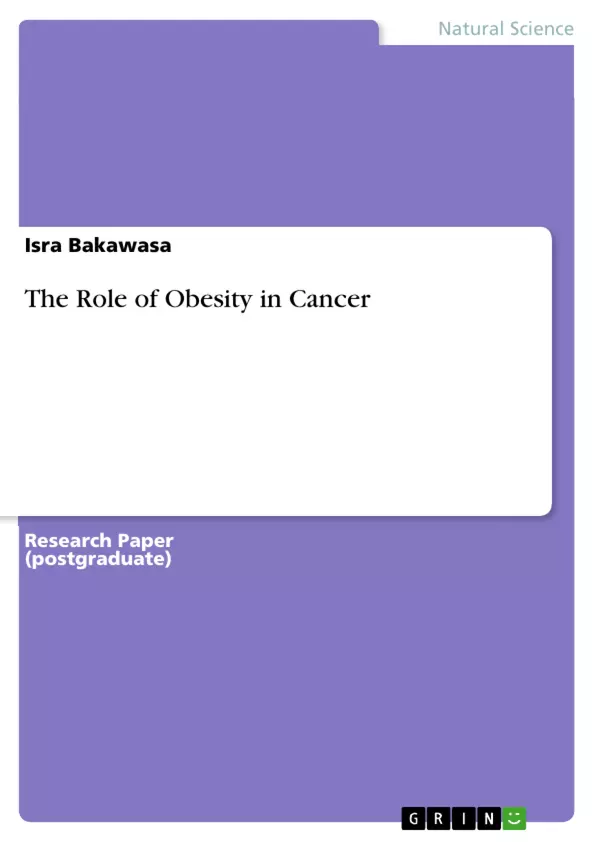Obesity is a known cause of cancer, with worldwide research and epidemiological studies supporting the relationship between obesity and cancer. Obesity can lead to a number of cancers, through cellular and metabolic changes in the body. Hyperinsulenimia, low levels of estrogens and Insulin like growth factor binding protein-3 (IGF-BP3) are among the major causes of cancers that result from obesity. In this study we aim at reviewing the metabolic changes that accompany obesity and cancer, the molecular mechanisms associated with obesity and cancer and finally the epidemiological significance of this relationship.
Inhaltsverzeichnis (Table of Contents)
- Introduction
- Background
- Obesity
- Factors contributing to obesity
- Genetics, Obesity and the Environment
- Role of Hormones in Obesity
- Human Microbiome and Obesity
Zielsetzung und Themenschwerpunkte (Objectives and Key Themes)
This study aims to review the relationship between obesity and cancer, exploring the metabolic changes associated with obesity, the molecular mechanisms underlying the link between obesity and cancer, and the epidemiological significance of this relationship.
- Metabolic changes accompanying obesity and cancer
- Molecular mechanisms linking obesity and cancer
- Epidemiological significance of the obesity-cancer relationship
- The role of hormones, particularly estrogen, in obesity
- The influence of the human microbiome on obesity development
Zusammenfassung der Kapitel (Chapter Summaries)
The first chapter provides an overview of obesity as a well-established cause of cancer, highlighting the need to understand the underlying mechanisms that lead to cancer development in obese individuals.
The second chapter defines obesity, differentiating it from being overweight. It explores the key factors contributing to obesity, including metabolic imbalances, dietary trends, decreased physical activity, and genetic predisposition.
The third chapter delves into the complex interplay between genetics and environmental factors in the development of obesity. It examines gene-environment interactions, focusing on the influence of genotype on nutrition and physical activity. The chapter also explores the role of specific genes identified as regulators of obesity and highlights studies demonstrating the influence of genetics on individual susceptibility to weight gain.
The fourth chapter examines the role of hormones in obesity, specifically focusing on the influence of estrogen levels on body weight regulation. It describes the role of estrogen receptors in adipose tissues and discusses a human polymorphism in the ERα gene associated with increased fat deposition.
The fifth chapter explores the complex relationship between the human microbiome and obesity. It discusses the role of gut microbiota in nutrient breakdown and highlights studies that reveal subtle differences in gut flora between individuals with obesity and normal body weight. The chapter also examines the potential influence of phylum-level changes in gut microorganisms on obesity development.
Schlüsselwörter (Keywords)
Obesity, cancer, metabolic changes, molecular mechanisms, epidemiology, hormones, estrogen, human microbiome, genetics, environmental factors.
Frequently Asked Questions
How does obesity increase the risk of cancer?
Obesity leads to cellular and metabolic changes, such as hyperinsulinemia and altered estrogen levels, which can promote the development of various types of cancer.
What is the role of estrogen in obesity-related cancer?
Estrogen levels, regulated by adipose tissues, play a significant role in body weight regulation and can influence cancer risk through estrogen receptors.
Does the gut microbiome influence obesity?
Yes, studies show differences in the gut microbiota between obese and normal-weight individuals, suggesting that gut flora impacts nutrient breakdown and weight gain.
Are genetics a major factor in obesity?
Genetics interact with environmental factors to determine an individual's susceptibility to weight gain, with specific genes acting as regulators of obesity.
What is hyperinsulinemia in the context of cancer?
Hyperinsulinemia, or high levels of insulin, is a common metabolic change in obesity that is considered a major cause of cancer development.
What factors contribute most to the rise in obesity?
Key factors include metabolic imbalances, modern dietary trends (high-calorie intake), and a significant decrease in physical activity.
- Quote paper
- Isra Bakawasa (Author), 2014, The Role of Obesity in Cancer, Munich, GRIN Verlag, https://www.grin.com/document/287251



